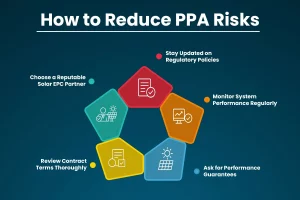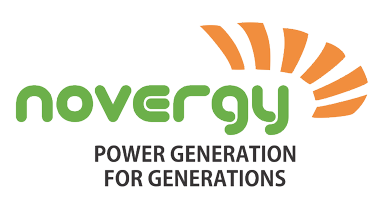Introduction to Solar PPAs
Many industrialists have switched to solar energy, and many others want to, but they face high upfront costs and complex ownership models. To fix this problem, a model in the solar industry, OpeX Solar, was introduced.
In an OpeX Solar Model, there is a contract between the buyer and seller of solar energy, known as a Power Purchase Agreement (PPA). PPAs allow users to use solar energy without owning the system.
In this blog, we will discuss what a PPA is, its importance, and the benefits and challenges it presents.
What is a Power Purchase Agreement (PPA)?
A Power Purchase Agreement is an agreement between a solar developer who has a solar system and a business that wants to buy solar power. This agreement usually happens when the buyer and seller agree on a fixed price for a fixed period of time (Usually 15-20 years).
This agreement was made with a focus on removing the burden of buying a new solar system and using solar energy from a third-party supplier. This model helps the buyer save on installation and maintenance costs.
For example, if an industrialist buys solar energy from a third-party supplier under the Power Purchase Agreement for a duration of 15 years, then they have to pay a fixed amount to the seller, which will be lower than grid electricity.
Why PPAs are Important in the Solar Industry
1. Easily Accessible
PPAs make it easy for many businesses to access solar energy, as there is no upfront or maintenance cost in this solar model.
2. Predictable Energy Costs
In the agreement, it is already stated what the cost of electricity will be per kWh, making the energy costs predictable for the buyer.
3. Clean Energy Transition
PPA is helping people transition to renewable energy, making India a clean energy country.
Key Benefits of Solar PPAs for Businesses
Here are some benefits of Solar PPA that you should know about before making the contract:
1. Zero Upfront Investment
In the Purchase Power Agreement, there is no need for any upfront investment; it is a monthly charge paid by the business owner, as per their use of solar energy.
2. Predictable Energy Costs
The monthly or yearly cost is predictable by the buyer, as it is pre-decided at the time of signing the PPA. The cost of using Solar PPA is still lower than the cost of using grid energy.
3. No Maintenance Responsibility
People using the solar CapeX model have to maintain their solar systems every 3-4 months so they can use them at full efficiency. But, in the Opex model, there is no need for such maintenance costs, as you don’t own the system.
4. Sustainability Goals
By switching to PPA, industries significantly reduce their carbon footprint, cut greenhouse gas emissions, and contribute to global climate goals, strengthening a company’s environmental responsibility and positioning as a forward-thinking leader in its sector.
5. Scalable Energy Model
The scalability and flexibility of solar power are more in this model, as the agreement can be extended and used by a small company or a large business.
Challenges and Risks in Power Purchase Agreements
Here are the Challenges and Risks in Power Purchase Agreements that a business should consider before agreeing to the agreement:
1. Contract Complexity
Usually, PPAs are of around 15-20 years, and these long-term agreements can be complex to understand, which is why it is important to understand the terms and conditions of the agreement before signing it with a third-party contractor.
2. Performance Risks
It will be helpful if you know the contractor personally before signing the PPA, as there is a chance that the owner does not maintain their solar system very well, leading to underperformance and a reduction in the expected savings.
3. Regulatory Changes
Power Purchase Agreements are long-term contracts, and with time, there can be changes in the policy of the agreement, which can affect long-term profitability.
4. Exit Clauses
Exit clauses in a PPA mean the conditions under which either party can terminate the contract before its agreed duration. Since PPAs are typically long-term (10–25 years), understanding these clauses is crucial. Some agreements may include penalties or buyout options if the customer wishes to exit early.
How to Reduce PPA Risks

Here are some ways through which you can mitigate PPA Risks:
1. Choose a Reputable Solar EPC Partner
Working with an experienced and trusted solar EPC provider ensures transparency, reliability, and compliance with all technical and legal requirements. An established provider can help structure the agreement clearly and guarantee system performance.
2. Review Contract Terms Thoroughly
Before signing a PPA, review it carefully, especially the terms related to tariff, contract duration, performance guarantees, and exit terms. You can also contact a trusted person to ensure that the contract aligns with your business goals.
3. Ask for Performance Guarantees
Ensure that your PPA has compensation clauses so that if the system underperforms. This helps maintain consistent savings and builds accountability.
4. Monitor System Performance Regularly
Use energy monitoring systems or periodic audits to track your solar system’s performance. Continuous monitoring ensures transparency and early detection of issues.
5. Stay Updated on Regulatory Policies
Keep track of local and national energy regulations, as government policies or tariff changes can impact your PPA over time. Working with a proactive EPC provider helps manage these transitions smoothly.
Conclusion
Power Purchase Agreements (PPAs) have become a game-changer for industries looking to switch to solar without heavy upfront costs. They offer predictable energy pricing, eliminate maintenance worries, and help businesses contribute to a greener planet. However, understanding the terms, performance guarantees, and exit clauses is crucial before signing any agreement.
By partnering with a trusted and experienced solar EPC provider like Novergy Solar, you can ensure complete transparency, reliable performance, and long-term energy savings. Whether you’re an industrialist, business owner, or sustainability-driven organization, Novergy can help you design the right solar solution that fits your goals.
Contact Novergy Solar today to learn more about Power Purchase Agreements and discover how your business can benefit from clean, cost-effective solar energy.
FAQs Related to Power Purchase Agreement
1. Is solar PPA a good idea?
Ans- Compared to grid electricity, solar energy saves 10% to 30% of monthly electricity costs.
2. What is a disadvantage of PPA?
Ans- The Long-term nature or contract complexity can be a disadvantage of solar PPA.

